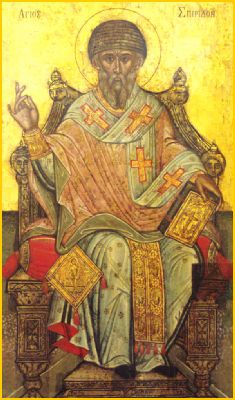|
|||
|---|---|---|---|
| This weekly bulletin insert complements the curriculum published by the Department of Christian Education of the Orthodox Church in America. This and many other Christian Education resources are available at http://dce.oca.org. | |||

The first words of a well-known Shaker song are "Tis the gift to be simple" and they could well apply to the great saint Spyridon, the Wonderworker and Bishop. Spyridon's life from its very early years was simple. Born in 270, he was a shepherd on the island of Cyprus, his birthplace, and came from a family of farmers. Though they were not educated, his parents were devout Christians and raised him in the Church. He married early in life and had a daughter, but his wife died when he was still fairly young. After her death he decided to devote his life to God's service and become a monk. His daughter, following his example, also entered the monastic life. Spyridon's background, unlike that of many bishops, was not one of advanced education and study. Yet his dedication to God and his deep faith led to his being chosen as Bishop of Tremithus. And even though he had taken on this immense responsibility, he didn't change his way of life. He continued to care for his own cattle and till his land. The abundant produce that the land produced was mostly given to the poor, while Spyridon himself ate sparingly of the simplest food, as he had always done. Though his work was no threat to anyone, Spyridon was persecuted, mutilated and exiled to slave labor in the mines of Spain toward the end of the third century. When he was finally allowed to return to his diocese, he continued to work with the poor and to bring many pagans to the Christian faith. Being a person without great education or sophistication did not mean that Spyridon could not find ways of explaining the complex teaching that God is Trinity. He is credited with using the helpful image of a piece of pottery to describe the three Divine Persons. Pottery is made, he said, of three elements: earth, water, and the effect of fire. Yet these three are united in the pot that is produced. In the same way the Persons of the Trinity are three and distinct, yet united. It was at the Council of Nicaea that Bishop Spyridon, so familiar with the elements of farming and the earth, impressed people with this image.
Spyridon's simplicity made him humble enough to be open to God's guidance, and he was given the gift to work wonders. He was able to cast out demons, bring rain in a time of drought, and heal the sick. Yet his humility never altered. When because of his modest dress he was not recognized as a bishop and was insulted by an arrogant guard, he didn't take offense but quietly accepted the ill-treatment. Spyridon died in 348, and was buried in the Church of the Apostles in Tremithus, where he had served for so long. His relics were transferred to the Greek island of Corfu, having been discovered to be incorrupt. His grave sent forth the fragrance of basil, that herb associated with the cross and with kings. |
|||
